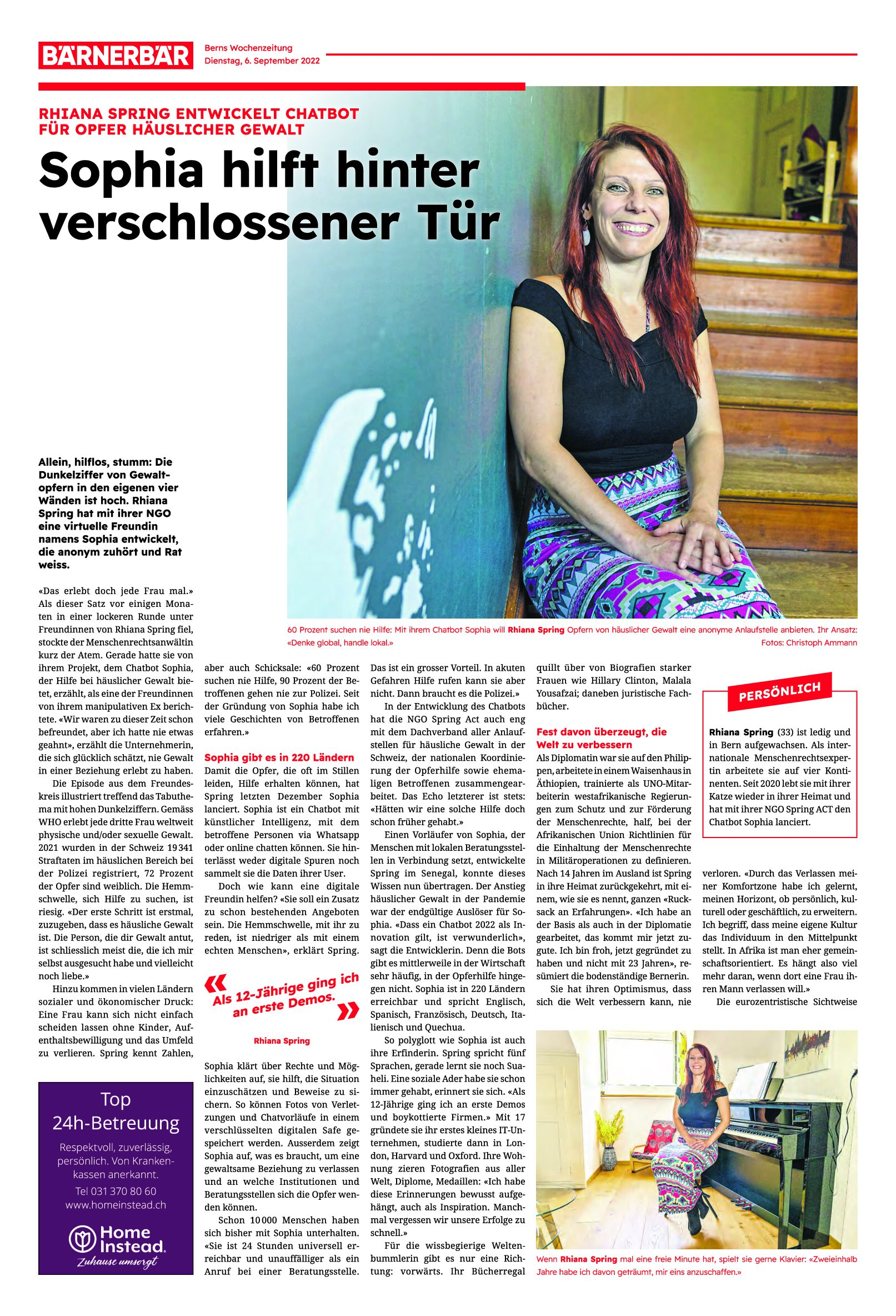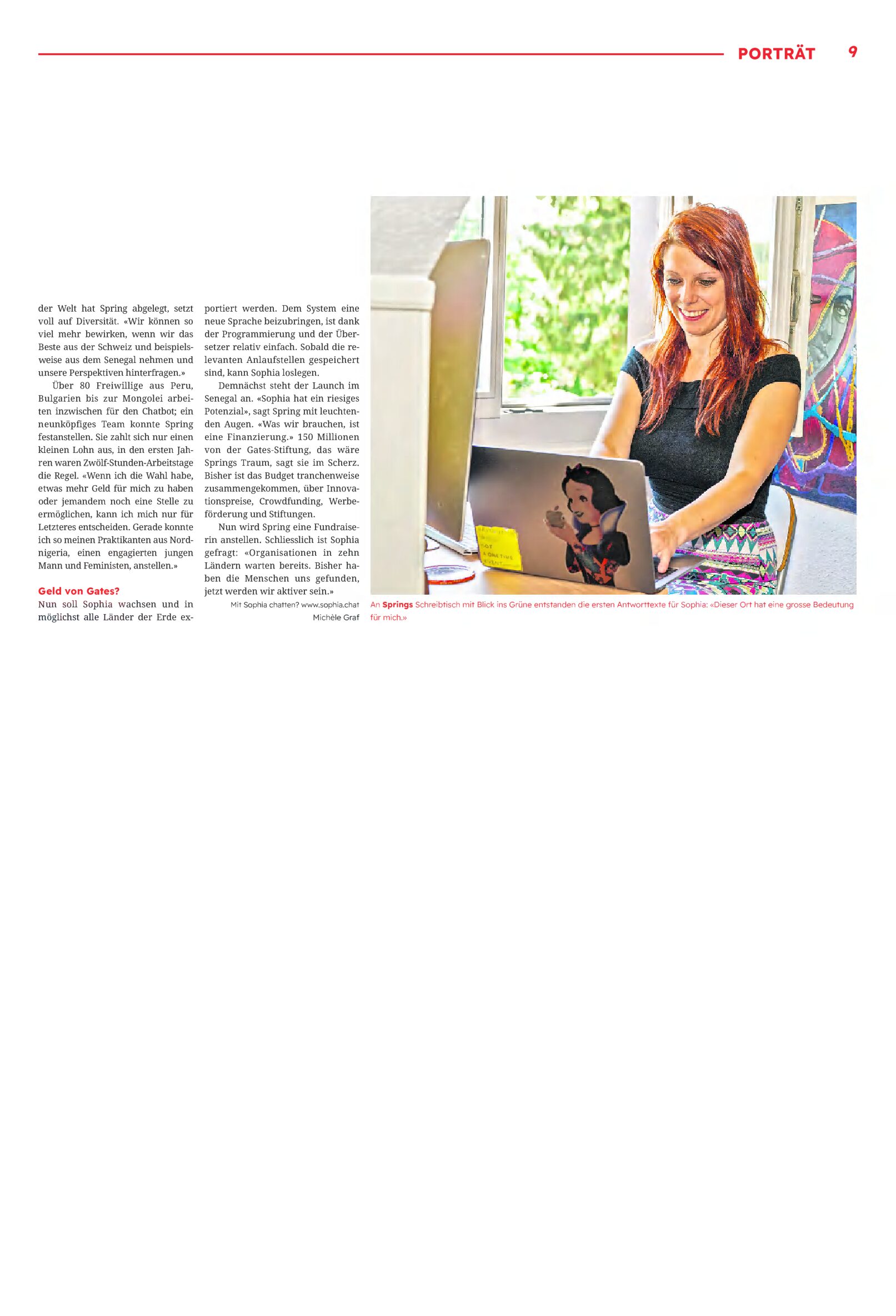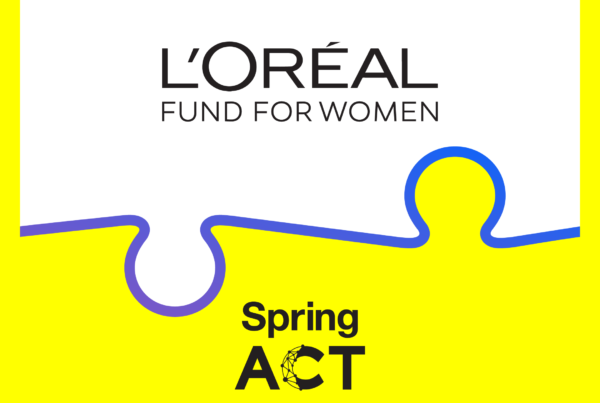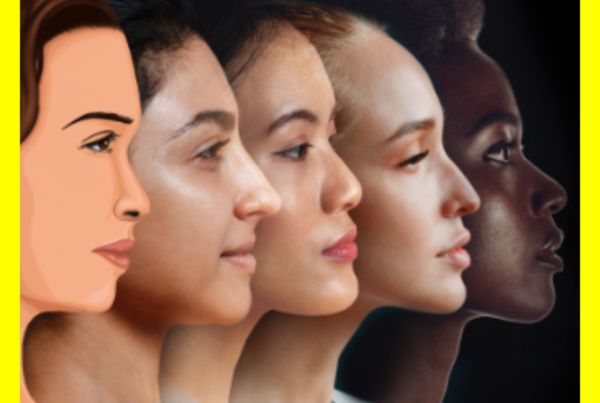
The Swiss newspaper Bärner Bär wrote a portrait on our founder Rhiana Spring and the chatbot Sophia that we have developed to help survivors of domestic violence around the world to gather potential evidence and seek help. If you are suffering from abuse, please chat completely anonymously to Sophia today: www.sophia.chat
Read the full Bärner Bär article here in German and below the English translation:
Sophia Helps Behind Closed Doors
“Every woman experiences this at some point. When this sentence was uttered a few months ago in a casual conversation among Rhiana Spring’s friends, the human rights lawyer’s breath caught for a moment. She had just finished talking about her project, the chatbot Sophia, which offers help with domestic violence, when one of the friends told her about her manipulative ex. “We were already friends at that time, but I had never suspected anything,” says the entrepreneur, who considers herself lucky never to have experienced violence in a relationship. The episode from her circle of friends aptly illustrates the taboo topic with high unrecorded figures. According to the WHO, every third woman worldwide experiences physical and/or sexual violence. In 2021, 19341 domestic crimes were registered with the police in Switzerland, 72 percent of the victims are female. The inhibition threshold to seek help is huge. “The first step is to admit that it is domestic violence. After all, the person who does violence to you is usually the one I chose myself and maybe still love.” In addition, there are social and economic pressures in many countries; a woman cannot simply divorce without losing her children, her residence permit and her environment. Spring knows the numbers, but also the fates: “60 per cent never seek help, 90 per cent of those affected never go to the police. Since Sophia was founded, I have heard many victims’ stories.”
Sophia is available in 222 countries
So that victims, who often suffer in silence, can get help, Spring launched Sophia last December. Sophia is a chatbot with artificial intelligence that affected people can chat with via WhatsApp or online. She leaves no digital traces, nor does she collect the data of her users. But how can a digital friend help? “It should be an addition to existing services. The inhibition threshold to talk to her is lower than with a real person,” explains Spring.
“As a 12-year-old, I went to my first demonstrations.”
– Rhiana Spring
Sophia explains rights and options, she helps to assess the situation and secure evidence. For example, photos of injuries and chat histories can be stored in an encrypted digital safe. Sophia also shows what you need to know about leaving an abusive relationship and which intuitions and counselling centres victims can turn to. Already 10000 people have talked to Sophia so far. “She is universally available 24 hours and is more inconspicuous than calling a counselling centre. That is a big advantage. But she can’t call for help in acute danger. Then it needs the police.” In the development of the chatbot, the NGO Spring ACT also worked closely with the umbrella organisation of all contact points for domestic violence in Switzerland, the national coordination of victim support and survivors. The reaction of the survivors who contact Spring is always the same: If only we had had such help earlier. A forerunner of Sophia, which connects people with local counselling centres, Spring developed in Senegal, could now transfer this knowledge. The rise in domestic violence in the pandemic was the final trigger for Sophia. “That a chatbot is considered an innovation in 2022 is surprising,” says the developer. After all, bots are now very common in business, but not in victim support. Sophia can be reached in 220 countries and speaks English, Spanish, French, German, Italian and Quechua.
Sophia’s inventor is as polyglot as she is. Spring speaks five languages and is currently learning Swahili. She has always had a social streak, she recalls. “As a 12-year-old, I went to my first demonstrations and boycotted companies.” At 17, she founded her first small IT company, then studied in London, Harvard and Oxford. Her flat is adorned with photographs from all over the world, diplomas, medals: “I deliberately put these memories up, also as inspiration. Sometimes we forget our successes too quickly,” says the founder. For the inquisitive globetrotter, there is only one direction: forward. Her bookshelf is overflowing with biographies of strong women like Hillary Clinton and Malala Yousafzai, as well as legal textbooks.
Firmly convinced about changing the world
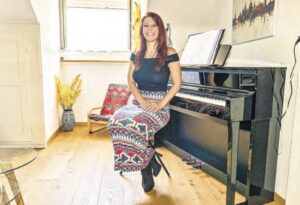 She has been to the Philippines as a diplomat, worked in an orphanage in Ethiopia, trained West African governments to protect and promote human rights as a UN staff member, helped define guidelines for human rights compliance in military operations at the African Union. After 14 years abroad, Spring has returned home with what she calls a “backpack of experiences”. “I have worked at the grassroots level as well as in politics, and this is benefiting me now. I’m glad I founded the organisation now and not when I was 23,” sums up the down-to-earth Bernese.
She has been to the Philippines as a diplomat, worked in an orphanage in Ethiopia, trained West African governments to protect and promote human rights as a UN staff member, helped define guidelines for human rights compliance in military operations at the African Union. After 14 years abroad, Spring has returned home with what she calls a “backpack of experiences”. “I have worked at the grassroots level as well as in politics, and this is benefiting me now. I’m glad I founded the organisation now and not when I was 23,” sums up the down-to-earth Bernese.
She has never lost her optimism that the world can improve. “By stepping out of my comfort zone, I learned to broaden my horizons, whether personal, cultural or business. I realised that my own culture focuses on the individual. In Africa, people are more community-oriented. So there is much more attached to a woman wanting to leave her husband there.”
Spring has discarded the Eurocentric view of the world and is fully committed to diversity. “We can make so much more of a difference if we take the best from Switzerland and Senegal, for example, and challenge our perspectives.” More than 80 volunteers from Peru, Bulgaria to Mongolia now work for the chatbot, and Spring was able to hire a permanent team of nine. She pays herself only a small salary; in the first few years, twelve-hour workdays were the norm. “If I have the choice of having a little more money for myself or enabling someone else to have a job, I can only choose the latter. Just now I was able to hire my intern from northern Nigeria, a dedicated young man and feminist.”
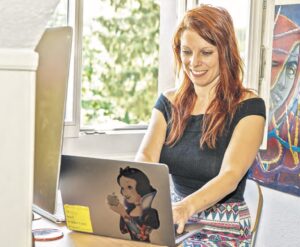 Money from the Gates?
Money from the Gates?
Now Sophia is to grow and be exported to as many countries around the world as possible. Teaching the system a new language is relatively easy thanks to programming and translators; as soon as the relevant contact points are saved, Sophia can get started. The launch in Senegal is coming up soon. “Sophia has huge potential,” says Spring, eyes shining. “What we need is funding.” 150 million from the Gates Foundation, that would be Spring’s dream, she says jokingly. So far, the budget has come together in tranches, via innovation awards, crowdfunding, advertising funding and foundations. Now Spring will hire a fundraiser. Finally, Sophia is in demand: “Organisations in ten countries are already waiting. So far people have found us, now we will do more outreach.”
– written by Michèle Graf


